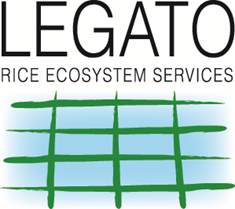Contact person: Fanny Langerwisch
Flagship activity: Ecosystem stability and dynamics

In order to advance long-term sustainable development of intensive land use systems, against risks arising from multiple aspects of global change, LEGATO quantified the dependence of ecosystem functions (ESF) and the services (ESS) they generate in agricultural systems in South East Asia. The focus was on local as well as regional land use intensity (including the socio-cultural and economic background) and biodiversity, and the impacts of future climate and land use change.
Following the framework of the Millennium Ecosystem Assessment (MEA), we defined supporting services as ESF and dealt with selected characteristic elements of the 3 service strands defined by the MEA:
- Provisioning (PS): nutrient cycling and crop production (including consequences for the hydrosphere)
- Regulating (RS): biocontrol and pollination
- Cultural Services (CS): cultural identity and aesthetics.
Studies were conducted in two countries of South-East Asia (The Philippines, Vietnam), in landscapes along a gradient reflecting changing geo-climatic and land use intensity, and where possible also cultural conditions. Focus was on landscapes shaped by irrigated rice. In particular it investigated the interactions between the rice crops and the surrounding landscapes in the light of ecological engineering. The overall objective was the elaboration and testing of generally applicable principles within the frame of ecological engineering. LEGATO tested and improved already existing indicators for ESF/ESS and their values - building upon but going beyond existing indicators sets like those of the CBD (Convention on Biological Diversity) and the SEBI (Streamlining European Biodiversity Indicators).
The LEGATO group at PIK developed in close cooperation with (local) project partners site-specific land-use change scenarios. The results of simulation runs conducted with LPJmL revealed the changes in four essential ESS (carbon storage, carbon sequestration, provision of irrigation water and rice production) under two climate scenarios (until 2100) and three site-specific land-use scenarios (until 2030), and examined the synergies and trade-offs in ESS responses to these drivers. Our results show that not all services can be provided in the same amounts in the future. The projections estimated a decrease in rice yields (by approx. 30%) and in carbon storage (by 15%) and sequestration (by 12%) towards the end of the century under the current land-use pattern. In contrast, the amount of available irrigation water was projected to increase in all scenarios by 10%–20%. However, the results also indicate that land-use change may partially offset the negative climate impacts in regions where cropland expansion is possible, although only at the expense of natural vegetation (Langerwisch et al. 2017 ERL).
As core output, LEGATO developed guidelines for optimising ESF/ESS given the local socio-cultural conditions and their stabilisation under future climate and land use change, which will particularly affect South and Southeast Asia.
As in LEGATO much of our knowledge about land use and ecosystem services in interrelated social-ecological
systems is derived from place-based research. While local and regional case studies provide valuable insights, it is often unclear how relevant this research is beyond the study areas. We estimate the transferability potential of project research by calculating the statistical similarity of locations across the world to the project archetype, assuming higher transferability potentials in locations with similar land system characteristics. Using specific examples from LEGATO and another local case studies, we highlight the merit of our approach to assess the tranferability and proposed that the method provides a blueprint for large research programs to assess potential transferability of place-based studies to other geographical areas and to indicate possible gaps in research
efforts (Václavík et al. 2016 ERL).
Project Page: LEGATO






